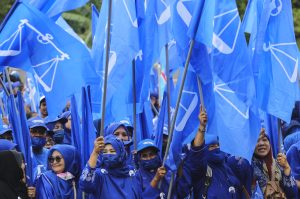On Saturday, Malaysia officially kicked off the two-week campaign period for its general election on November 19, when the United Malays National Organization (UMNO) is seeking to restore its pre-eminence four years after being sensationally dumped by the electorate.
Across the weekend, as the deadline for nominations closed, the major parties launched their campaigns with large rallies across the country. The general election, known as GE15 for short, will see more than 21 million eligible voters cast ballots to elect 222 members of the federal Parliament and 116 representatives for the state legislatures of Perak, Pahang, and Perlis.
In a complex and tightly fought race, the most prominent plot point will be UMNO’s attempt to return to power at the head of the Barisan Nasional (BN) coalition. This comes after BN lost unexpectedly at the 2018 election to Pakatan Harapan (PH), a multi-ethnic reformist coalition, the first time that UMNO had found itself in opposition since Malayan independence in 1957.
However, the PH government lasted barely two years, and collapsed amid a wave of political defections that brought UMNO back to power in early 2020. This ushered in a period of historically anomalous instability and flux in Malaysian politics, with the country seeing three prime ministers in three years. While UMNO was back in the cockpit of power, it relied on razor-thin majorities and the sufferance of other parties, while being infected by internal rivalries.
After a series of state election victories since 2020, many observers expect UMNO/BN to perform well on November 19, given its extensive patronage machinery and time-tested message of ethnic Malay uplift. As James Chin of the University of Tasmania told The Associated Press, “The general consensus is that the old ruling party Barisan Nasional will do very well and it is very likely that the only other coalition that can challenge BN is Pakatan Harapan.”
But this binary opposition is complicated by the presence of competing coalitions, such as the ethnic Malay Perikatan Nasional (PN) coalition headed by former Prime Minister Muhyiddin Yassin. Muhyiddin’s Bersatu party was a part of the PH coalition but then decamped in 2020 to enter a coalition government with UMNO.
Add to this the perennially complex electoral landscape of the Bornean states, Sabah and Sarawak, and Malaysian voters will confront a more complex, fractured political landscape than in many years. As Dr. Khoo Ying Hooi of the University of Malaya told The Diplomat in an interview last week, the scenario is also new to Malaysian voters, who have gotten used to choosing between two major political coalitions. As a result, she said, the election result is “far less certain than those of earlier elections have been.”
Scores of constituencies are facing multi-cornered fights, some involving prominent individuals. Prime Minister Ismail Sabri Yaakob of UMNO/BN faces a three-way fight against candidates from PH and PN, while perennial opposition leader Anwar Ibrahim, the president of Parti Keadilan Rakyat, will face three challengers in his seat. Remarkably, former Prime Minister Mahathir Mohamad (Gerakan Tanah Air) is also seeking to hold onto his seat in Langkawi at the scarcely believable age of 97.
As a result, some observers have suggested that if BN does not prevail, GE15 may simply reproduce the current instability, with no single coalition able to gain a clear majority.
Adding a further layer of complexity and uncertainty is the unknown impact of the recent lowering of the voting age from 21 to 18. A record 5.5 million first-time voters will take part in GE15, including around 1.4 million in the 18-20 age group, who would have been unable to take part under the old rules.
This infusion of new voters has to be weighed against both limited voter education and the likely impact of bad weather on turnout. Prime Minister Ismail Sabri has been roundly criticized for calling the election at the onset of the monsoon season, and the Malaysian authorities are warning that severe rains could sweep the country next week.

































